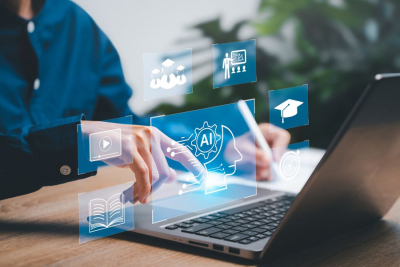It’s impossible to ignore Artificial Intelligence (AI) these days. Whilst we’re seeing a lot of use on social media and creative industries it is also, undeniably the next great revolution in the workplace. We are seeing it transform the way we do business, and the opportunities it presents are vast.
From speeding up administrative processes to supporting decision-making, improving efficiency, and enhancing customer service, the benefits of AI are difficult to ignore. Tools such as large language models like Chat-GPT can help draft reports in minutes, analyse data more quickly than any human, and even generate marketing content at the click of a mouse.
However, while AI has an impressive array of advantages, it is not a silver bullet for all organisational challenges. There are less apparent effects of AI use in the workplace that must be considered; particularly for mangers and HR professionals who are tasked with managing people, culture, and compliance.
For example, an issue already emerging is the impact of AI on recruitment. We have come across several organisations noticing the effects, specifically where job applications are strikingly similar in theme, style and messaging. This is because large language AI models are trained to predict what an employer is looking for based on the vacancy description.
This results in dozens, if not hundreds, of almost identical applications that clog up recruitment systems wasting time and resources.
Far from streamlining the process, AI-written applications can actually slow it down. Employers still need to sift through these templated CVs and cover letters, only to reject them for lack of originality or authenticity. For managers who are recruiting, a difficult and time consuming task as it is, this creates an additional administrative burden and makes identifying the genuine, high-quality candidates even more challenging.
Another concern is the tendency of employees to rely on AI-generated work without adequate checking. AI systems generate content by processing vast quantities of information from across the internet, crucially however, they cannot reliably distinguish fact from fiction. The web is full of questionable and biased content, and AI tools have no innate ability to filter fact from fiction.
This means an employee who submits AI-generated work without reviewing it risks producing something that is factually inaccurate, misleading, or of poor quality. In the best case, this means extra work for managers or colleagues who must double-check and correct it. In the worst case, it results in sloppy, unreliable work that damages credibility with colleagues, clients or customers.
Such risks are not merely theoretical. There have already been legal cases where AI tools were used to draft documents and cited legal precedents that it had itself made up. Consequently, the results completely undermined the credibility of the professional involved.
Law and HR practice are fields that rely on interpretation and nuance of legislation. For instance, Employment Law is rarely black and white; context, precedent and company culture all play critical roles in decision-making. Asking AI to decide the outcome of a disciplinary process or to draft policies without careful oversight risks overlooking key factors such as mitigating circumstances or organisational values.
Without structured protocols for AI use in the workplace, businesses risk exposing themselves to compliance failures, reputational harm, and legal liability.
None of this is to say that AI is not useful. It is here to stay, and when managed carefully it can be a powerful tool. But we must use it with caution. AI is still a long way from replicating human qualities such as humour, empathy, or emotional intelligence. And crucially, it cannot manage people.
Organisations will always need strong, capable managers who can navigate complex human dynamics, exercise judgement, and apply empathy. The best leaders will harness AI for its benefits, but will also understand its limits and maintain a people-centred approach to management.
That is why keeping your managers at the top of their game is more important than ever. At HR Champions, our management training, and in particular our ILM-accredited Leadership and Management programmes, equips managers with the skills to manage people effectively, maintain productivity, and set the right frameworks for responsible AI use.
AI may help with efficiency, but only well-trained managers can deliver engagement, growth, and a positive workplace culture. By investing in your leaders, you ensure that technology serves your organisation rather than the other way round.
Contact HR Champions today to book some top-quality management training for your team and keep your leaders ready for the future. Call us on 01452 331331, or complete the contact form.



